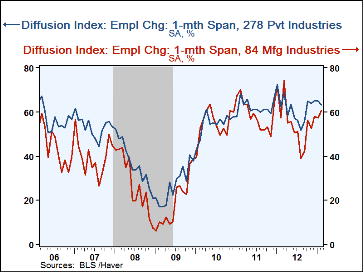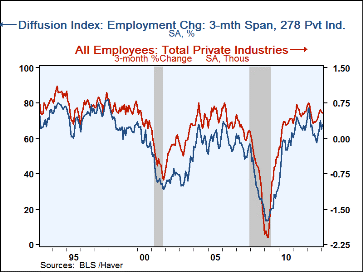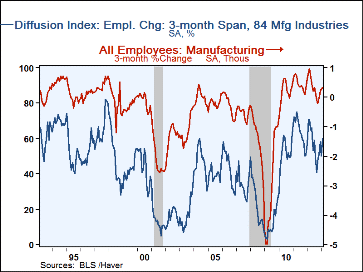 Global| Mar 11 2013
Global| Mar 11 2013U.S. Breadth of Job Increase is Improved
by:Tom Moeller
|in:Economy in Brief
Summary
Since 1990, diffusion indexes of payroll employment have moved with the change in overall employment. Therefore, recent moderate payroll gains are well-grounded. For private nonfarm production industries, 63.3% added to payrolls last [...]
 Since 1990, diffusion indexes of payroll employment
have moved with the change in overall employment. Therefore, recent
moderate payroll gains are well-grounded. For
private nonfarm production industries, 63.3% added to payrolls last month
versus January. That's improved from 61.6% on average during each month of
last year. Over a three-month span the pickup in the breadth of job gain
is to an even firmer 68.0% compared to 66.2% during all of 2012.
That improvement was accompanied by a 246,000 (1.9% y/y) increase in
private nonfarm payrolls, the strongest increase in
three months and the second strongest in a year.
Since 1990, diffusion indexes of payroll employment
have moved with the change in overall employment. Therefore, recent
moderate payroll gains are well-grounded. For
private nonfarm production industries, 63.3% added to payrolls last month
versus January. That's improved from 61.6% on average during each month of
last year. Over a three-month span the pickup in the breadth of job gain
is to an even firmer 68.0% compared to 66.2% during all of 2012.
That improvement was accompanied by a 246,000 (1.9% y/y) increase in
private nonfarm payrolls, the strongest increase in
three months and the second strongest in a year.
Factory sector improvement in the breadth of job gain also is in evidence, but it's less compelling. During February, over a one-month span 60.5% of industries added to payrolls. Over a three-month period, however, a lesser 59.9% added to employment while just 49.4% added jobs over a six-month period. These modest breadth of gain are consistent with manufacturing payrolls small 14,000 rise during February. While that was the best rise in three months, it left payrolls up just 0.9% y/y.
The figures referenced above are available in Haver's EMPL database and USECON databases.
| Diffusion Indexes of Employment Change (%) | 1-Mth Span | 3-Mth Span | 6-Mth Span | 2012-1 Mth. Avg. | 2011-1 Mth. Avg. | 2010-1 Mth. Avg. |
|---|---|---|---|---|---|---|
| Private Nonfarm Production Workers | 63.3 | 68.0 | 68.4 | 61.6 | 62.1 | 54.7 |
| Manufacturing Production Workers | 60.5 | 59.9 | 49.4 | 55.3 | 58.8 | 54.6 |
Tom Moeller
AuthorMore in Author Profile »Prior to joining Haver Analytics in 2000, Mr. Moeller worked as the Economist at Chancellor Capital Management from 1985 to 1999. There, he developed comprehensive economic forecasts and interpreted economic data for equity and fixed income portfolio managers. Also at Chancellor, Mr. Moeller worked as an equity analyst and was responsible for researching and rating companies in the economically sensitive automobile and housing industries for investment in Chancellor’s equity portfolio. Prior to joining Chancellor, Mr. Moeller was an Economist at Citibank from 1979 to 1984. He also analyzed pricing behavior in the metals industry for the Council on Wage and Price Stability in Washington, D.C. In 1999, Mr. Moeller received the award for most accurate forecast from the Forecasters' Club of New York. From 1990 to 1992 he was President of the New York Association for Business Economists. Mr. Moeller earned an M.B.A. in Finance from Fordham University, where he graduated in 1987. He holds a Bachelor of Arts in Economics from George Washington University.
More Economy in Brief
 Global| Feb 05 2026
Global| Feb 05 2026Charts of the Week: Balanced Policy, Resilient Data and AI Narratives
by:Andrew Cates








